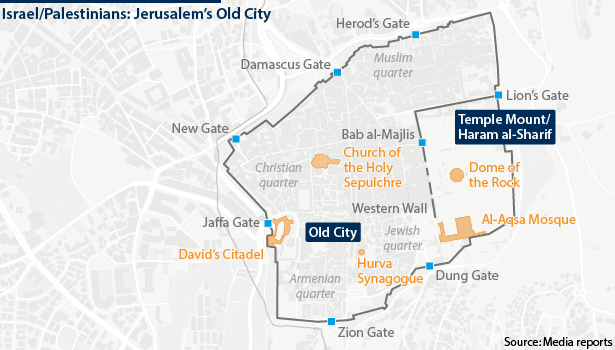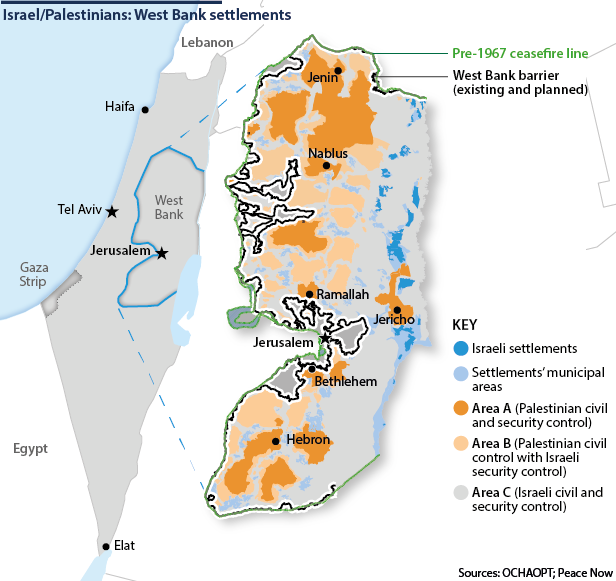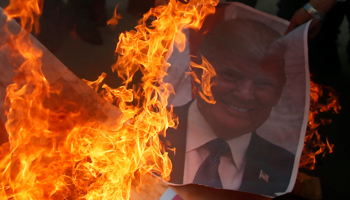Trump’s Jerusalem move may undermine his Iran policy
Despite warnings from across the world, the United States became the first country to name Jerusalem as Israel’s capital
US President Donald Trump yesterday recognised Jerusalem as the capital of Israel, and ordered the State Department to begin the process of moving the US Embassy there. Previously, the United States, like the rest of the international community, had held that the question of Jerusalem's status was an issue for final-status negotiations between Israel and the Palestinians. After taking East Jerusalem in the 1967 war, Israel declared the whole city as its “indivisible” capital; however, its settlements there are not recognised under international law.
What next
The UN Security Council will meet tomorrow to discuss the Jerusalem decision, although the US veto will constrain formal criticism. Vice President Mike Pence will visit the region to cement alliances, which could prove difficult, as Arab rulers will be forced to shore up their legitimacy by voicing strong disapproval. The burgeoning US-Sunni-Israeli front against Iran will be damaged. Violent demonstrations in the Palestinian territories are unlikely to develop into a new ‘intifada’ (mass uprising).
Subsidiary Impacts
- A two-state solution to the Israeli-Palestinian issue will become even more unlikely.
- Trump's high-profile gesture will shore up the domestic position of the Israeli premier.
- Fears of Palestinian violence could put short-term pressure on Israel’s currency and stock market.
- Trump will cement his appeal to core supporters (further helped by the anger of ideological opponents).
Analysis
Since the US Congress passed the Jerusalem Embassy Act in 1995, successive presidents have deferred moving the embassy from Tel Aviv on national security grounds. Many presidential candidates have sought to appeal to sections of the Jewish and evangelical Christian votes by promising to enforce the act; however, in the interests of supporting the Israeli-Palestinian peace process, none until Trump has actually done so.
In his speech yesterday, the president argued that he was simply recognising the "obvious": that Jerusalem is Israel's administrative capital. He also said that the move did not prejudge final-status issues such as the "specific boundaries of Israeli sovereignty in Jerusalem".
International responses
However, most international actors disagreed with this stance. In the Arab and Muslim worlds, the negative response was stronger, with Turkey even threatening to cut diplomatic ties. Even US allies such as Jordan, Egypt, Saudi Arabia and the United Arab Emirates spoke out against it strongly.
Hamas warned Trump was opening "the gates of hell"
Among the Palestinians, a Fatah spokesman described the move as a dangerous violation of international law that disqualified the United States as a mediator, threatening to close the Palestinian mission in Washington and calling for non-violent protests. Rival Hamas movement said the decision would "open the gates of hell on US interests in the region", threatening a new intifada against Israel.
Israel was almost alone in praising the move. Prime Minister Binyamin Netanyahu was joined by many others from both right and left in lauding the change: Jerusalem's status is a unifying issue across much of the Israeli political spectrum. However, the US State Department asked Israeli officials to restrain their response, fearing a backlash against US interests in the region.
Peace process
Since announcing the annexation of East Jerusalem in 1967, Israel has looked to alter facts on the ground that would favour Jerusalem becoming part of the Israeli state. It has moved around 200,000 settlers into the area -- about half as many as in the whole of the West Bank. Major West Bank Israeli settlements have also been positioned to cut East Jerusalem off from Arab areas (see ISRAEL/PALESTINIANS: Settlements will likely expand - October 2, 2017).
Arabs living in East Jerusalem face multiple challenges to maintain their residency and property rights (many are not Israeli citizens), to gain building permits or residency permission for spouses. They also suffer from poor infrastructure and services, as well as high poverty levels.
Palestinians say that Israel's annexation of East Jerusalem is illegal, and that the area should be the capital of a future Palestinian state. The international community largely shares this view.
Trump's motivations
The US announcement reportedly followed a split within the administration between those such as Pence, who spearheaded evangelical Christian support for the announcement, and opponents including US Secretary of State Rex Tillerson and Defense Secretary James Mattis, who feared the regional impact.
Trump seeks to underline his differences from former presidents
As with his decision not to renew the waiver on sanctions under the Iran nuclear deal and his line on the Paris Agreement, Trump may have lost patience with those pushing him towards a diplomatic solution undercutting his campaign promises (see EU/IRAN: Nuclear deal uncertainty may deter investors - November 14, 2017 and see US/INT: Paris moves reflect Trump disruption risks - June 2, 2017). He sharply criticised former presidents who had reneged on commitments to the "long overdue" move.
Trump may also be gambling, as with the Iran decision, that he can announce a shift without committing to full follow-through. He emphasised his ongoing commitment to facilitating a peace deal, and promised to support the internationally-mandated two-state solution "if agreed by both sides" -- a significant proviso (see ISRAEL/PALESTINIANS: One-state solution will falter - February 17, 2017).
In fact, however, the announcement underlines the administration's lack of any real commitment to the peace process. The president's son-in-law Jared Kushner is rumoured to be working on a draft deal to be announced in March; however, Palestinians will be reluctant to accept any suggestions from a mediator seen as biased towards Israel.
Palestinian impact
Trump's announcement has sparked protests in various countries, including the West Bank and Gaza, where a general strike was declared. Washington also told its diplomats to defer all non-essential travel to Israel, Jerusalem and the West Bank for the next fortnight.
However, a full-blown intifada is unlikely, despite Hamas's threats. In contrast to previous uprisings, Israel has now imposed much tighter security controls and separation between Jewish and Arab populations. Arms are harder to bring in, and knife and vehicle attacks often only kill the attackers.
Moreover, none of the current Palestinian leadership is able to organise a mass response. Palestinian President Mahmoud Abbas is too strongly associated with the peace process to reject it now: he cannot risk being blamed by Washington for its failure.
Hamas, meanwhile, is in an economic bind in Gaza and needs its Egyptian-sponsored reconciliation agreement with Abbas to work in order to gain some breathing space (see PALESTINIANS: Arms issue could quash reconciliation - October 20, 2017). Thus, as with demonstrations earlier this year over the al-Aqsa Mosque, Palestinian protest will be vehement but ultimately limited (see ISRAEL/PALESTINIANS: West Bank clashes could resurge - August 4, 2017)
Regional impact
Demonstrations across the wider Arab world -- with US flags currently being burned in Cairo -- are also unlikely to change much. Governments will seek to contain these through security crackdowns and denunciations of the policy change. US embassies and interests, however, could face heightened danger.
The major diplomatic impact will be on the cohesion of the Riyadh-led tacit Sunni alliance with Israel that the Trump administration has been building up to confront Tehran. With Iran making the most of the opportunity to denounce its Arab enemies' betrayal of the Palestinian cause, Saudi King Salman -- whose position draws heavily on his religious legitimacy as the Custodian of the Two Holy Mosques -- is in a difficult position.
At least in the short term, Saudi Arabia will have to step up criticism of Washington and draw back from any appearance of coordination with Israel against Iranian interests in Syria or Lebanon. There is a risk this could further alienate Trump, who last night unexpectedly demanded that Riyadh lift its blockade of Yemen, in what may have been a tit-for-tat response to its lack of support over the Jerusalem decision.


